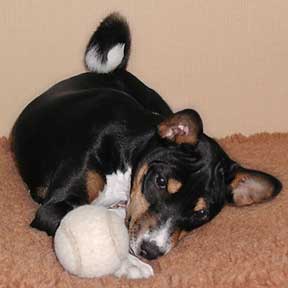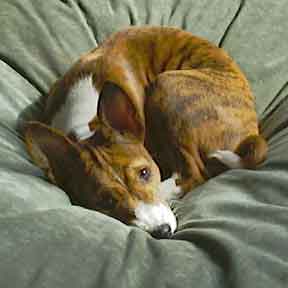
They're Cute!
And their short coats, moderate size, stunning appearance as adults only add to their appeal. Plus they don’t bark. But, they’re little dickens! The Basenji may be the only breed where their owners brag about the destruction they wreak. New owners quickly learn to put dirty clothes in the hamper, the remote in a drawer, and the garbage behind a closed door. They also learn that a tired dog is a good dog. And that a Basenji raised with love and patience is a joy unmatched by any other. Explore these pages to find out why Basenji enthusiasts prefer this breed above others. Basenjis are not hypoallergenic. Some people are allergic and some people with problems tolerate them well.

Really, they don't bark, but they do barooo!
Basenjis do not yap incessantly, but they are not mute. They can growl, whimper, and whine with the best of them. They have a hair raising scream as well as a delightful sound some owners describe as a yodel. These are not the only characteristics that set Basenjis apart from other breeds. They are often described as cat-like, and depending on how much you like cats, this might be appealing. If possible, spend some time with adult Basenjis. You may realize that you want a more dog-like dog, or you may fall in love with this special breed.

They're Irrepressible!
And if all goes well, you'll be able to enjoy their antics for many years. As is true for all breeds, Basenjis can have inheritable health problems. Among the diseases to be aware of are Fanconi Syndrome, Progressive Retinal Atrophy (PRA), IPSID, Hypothryroidism, and Hip Dysplasia. To find out more about these diseases, visit the Health Information link above. While no breeder can be 100% certain that a puppy will be free from disease, some breeders will guarantee the health of their pups. Breeders who are concerned about the welfare of the breed do their best to produce healthy Basenjis by using all available health testing before they breed. Know what to ask, and ask before you buy!

They're smart, not necessarily obedient!
And they will out smart and out-train you if you’re not careful. Enrollment in puppy kindergarten and basic household obedience is strongly encouraged. A good obedience class will help you learn to communicate with your Basenji and improve the quality of life for all. Basenjis have a reputation for being untrainable but they learn quickly using positive reinforcement techniques. Avoid trainers who use harsh techniques—there is never a reason to hit or harm a dog during training.

They're energetic!
But they won’t grow up to be a frisbee dog and you’ll be hard pressed to get most Basenjis to fetch a stick with any reliability. What they will do is chase every squirrel, cat, and rabbit they see, so it’s essential to keep them on leash unless they are in a secure area. There are activities you can enjoy with your Basenji. Visit the Sites of Interest link below to learn about lure coursing, tracking, conformation, obedience, and agility. Basenji Club of America (BCOA) members look forward to meeting you and your new pup at the next event!

They're a handful!
If you are not up for the nonstop demands of a Basenji puppy, or don’t want to subject your carpets to the trials of house training, not to mention the general mayhem, you might consider a young adult or an older dog. Most Basenjis adapt to a new family quite well and form a bond that is just as strong as if you had raised him/her from puppyhood. An adult dog may already be well-socialized, know some basic commands, and be past the stage when all household objects are considered chew toys. Visit the Basenji Club of America for a Rescue-Adoption contact in your area. Or ask to be put in touch with a breeder in your area--they may be looking for the perfect home for an older dog.

They're looking for the right home!
Although Basenjis usually come into season only once a year (in the fall), it's never too early to start interviewing breeders, for this year or next. You may have to travel a bit and, when you find a breeder you like, be prepared to wait for your puppy. Basenjis bred in the fall will deliver their puppies in late fall, early winter. The pups won't be ready to leave their mom and litter mates until they are at least eight weeks old and have their first set of shots. But your research and patience will pay off. The link above, Screening Breeders, will give you pointers on what to look for in a breeder and questions to ask.

Yodels!
This information is provided by the Basenji Club of America, a nonprofit organization dedicated to the well-being of the Basenji. This can be a challenging breed and the Basenji temperament may not be what some people expect in a dog. We hope you will find this information on Basenjis useful in making an informed decision when you purchase your new pup, regardless of the breed you ultimately choose.


